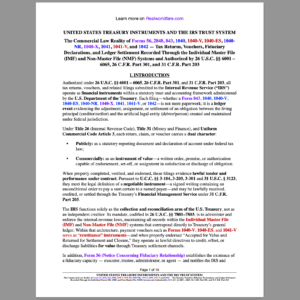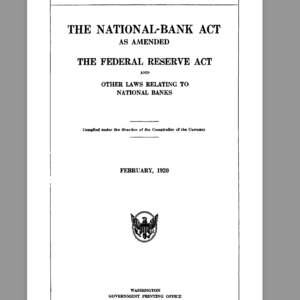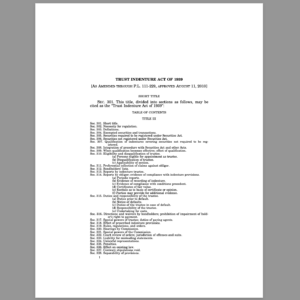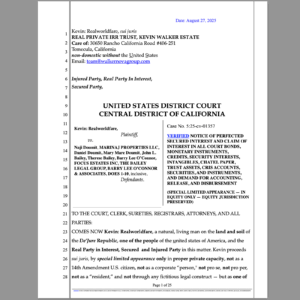Black’s Law Dictionary 1st Edition, page 115
BAILMENT. A delivery of goods or personal property, by one person to another, in trust for the execution of a special object upon or in relation to such goods, beneficial either to the bailor or bailee or both, and upon a contract, express or implied, to perform the trust and carry out such object, and thereupon either to redeliver the goods to the bailor or otherwise dispose of the same in conformity with the purpose of the trust. See Code Ga. 1882, § 2058.
A delivery of goods in trust upon a contract, ex· pressed or implied, that the trust shall be faith· fully executed on the part of the bailee. 2 Bl. Comm.455.
Bailment, from the French bailer, to deliver, is a delivery of goods for some purpose, upon a con· tract, express or implied, that. after tho purpose has been fulfilled, they shall be redelivered to tho bailor, or otherwise dealt with. according to his directions, or (as the case may be) kept till be reclaims them. 2 Steph. Comm. SO.
A delivery of goods in trust upon a contract, ex pressed or implied, that the trust shall be duly executed, and tho goods restored by the bailee as
800n as the purposes of the bailment shall be answered. 2 Ken� Comm. 559.
Bailment is a delivery of a thing in trust 101′ Borne special object or purpose, and t:pon a con tract, express or implied, to conform to the object or purpose of the trust. Story, Ba.Um. 8.
A delivery of goods in trust on a contract, either expressed or implied, that the trust shall be duly executed, and the goods redelivered as soon as the time or use for which they were bailed shall have elapsed or be performed. Jones, Bo.ilm. 117.
Bailment is a word of French origis, significant of the curtailed transfer, the delivery of mere banding over, which is appropriate to the transaction. Schouler, Pers. Prop. 695.
The test of a bailment is that the identical thing is to be returned; if another thing of equal value is to be returned, the transaction is a sale. 6 Thomp. & Co. 29; 3 Hun, 550.
Sir William Jones has divided bailments into five sorts, namely: Despotism, of deposit; mandatum, or commission without recompense; commodatum, or loan for use without pay; pignori acceptum, or pawn; locatum, or hiring, which is always with reward. This last is subdivided into locatiorei, or hiring, by which the hirer gains a temporary use of the thing; locatio operis faciendi when something is to be done to the thing delivered; locatio operis mercium vehendarum, when the thing is merely to be carried from one place to another. Jones, Bailm. 36.
Lord Hold divided bailments thus:
(1) Depositum, or a naked bailment of goods, to be kept for the use of the bailor.
(2) Commodatum. Where goods or chattels that are useful are lent to the bailee gratis, to be used by him.
(3) Locatio rei. Where goods are lent to the bailee to be used by him for hire.
(4) Vadium. Pawn or pledge.
(5) Locatio operis faceindi. Where goods delivered to be carried, or something is to be done about them, for a reward to be paid to the bailee.
(6) Mandatum. A delivery of goods to somebody who is to carry them, or do something about them gratis. 2 Ld. Raym. 909.
Another division, suggested by Bouvier, is as fellows; First, those bailments which are for the benefit of the bailor, or of some person whom he represents; second, those for the benefit of the bailee, or some person represented by him; third, those which are for the benefit of both parties.
Black’s Law Dictionary 4th Edition, page 179-180:
BAILMENT. A delivery of goods or personal property, by one person to another, in trust for the execution of a special object upon or in relation to such goods, beneficial either to the bailor or bailee or both, and upon a contract, express or implied, to perform the trust and carry out such object, and thereupon either to redeliver the goods to the bailor or otherwise dispose of the same in conformity with the purpose of the trust. Fulcher v. State, 32 Tex.Cr.R. 621, 25 S.W. 625.
A delivery of goods for some purpose, upon a contract, express or implied, that after the purpose has been fulfilled they shall be redelivered to the bailor, or otherwise dealt with according to his direction, or kept until reclaimed. In re George L. Nadell & Co., 294 Mich. 150, 292 N.W. 684, 686. A delivery of something of a personal nature by one party to another to be held according to the purpose or object of the delivery and to be returned or delivered over when that purpose is accomplished. Hardin v. Grant. Tex.Civ.App ..54 S.W.2d 189, 190; Hogan v. O’Brien, 206 N.Y.S. 831, 833, 123 Misc. 865. The term “bailment” is derived from the French word “bailler,” meaning “to deliver.” It imports a delivery of personal property by one person to another m trust for a specific purpose, with a contract, expressed o implied, that the trust shall be faithfully executed and the property re- turned or duly accounted for when the specific purpose is accomplished or kept until bailor claims it. Common- wealth v. Polk, 256 Ky. 100, 75 S.W.2d 761, 764.
According to Story, the contract does not necessarily imply an undertaking to redeliver the goods. On the other hand, Blackstone, although his definition does not include the return, speaks of it in all his examples of bailments as a duty of the bailee; and Kent says that the application of the term to cases in which no return or redelivery to the owner or his agent is contemplated, is extending the defini- tion of the term beyond its ordinary acceptation in English law. A consignment to a factor would be a bailment for sale, according to Story; while according to Kent it would not.
Classification
Sir William Jones has divided bailments into five sorts, namely: Depositum, or deposit; man- datum, or commission without recompense; com- modatum, or loan for use without pay; pignori acceptum, or pawn; locatum, or hiring, which is always with reward. This last is subdivided into locatio rei, or hiring, by which the hirer gains a temporary use of the thing; locatio operis facien- di, when something is to be done to the thing de- livered; locatio operis mercium vehendarum, when the thing is merely to be carried from one place to another. Jones, Bailm, 36.
Lord Holt divided bailments thus:
(1) Depositum, or a naked bailment of goods, to be kept for the use of the bailor.
(2) Commodatum. Where goods or chattels that are use- ful are lent to the bailee gratis, to be used by him.
(3) Locatio rei. Where goods are lent to the bailee to be used by him for hire.
(4) Vadium. Pawn or pledge.
(5) Locatio operis faciendi. Where goods are delivered to be carried, or something is to be done about them, for a reward to be paid to the bailee.
(6) Mandatum. A delivery of goods to somebody who is to carry them, or do something about them, gratis. 2 Ld. Raym. 909.
Another division, suggested by Bouvier as being a better general division for practical purposes, is as follows : First, those bailments which are for the benefit of the bailor, or of some person whom he represents; second, those for the benefit of the bailee, or some person repre- sented by him; third, those which are for the benefit of both parties.
In General
—Bailment for hire. A contract in which the bailor agrees to pay an adequate recompense for the safe-keeping of the thing intrusted to the cus- tody of the bailee, and the bailee agrees to keep it and restore it on the request of the bailor, in the same condition substantially as he received it, excepting injury or loss from causes for which he is not responsible.
—Bailment for mutual benefit. One in which the parties contemplate some price or compensa- tion in return for benefits flowing from the bail- ment, necessarily involving an express or im- plied agreement or undertaking to that effect. Armored Car Service, Inc. v. First Nat. Bank of Miami, Fla.App., 114 So.2d 431, 434. For example, delivery of automobile to one who, for a consider- ation, undertakes to repair it. Fox Chevrolet Sales, Inc. v. Middleton, to Use of Farm Bureau Mut. Auto. Ins. Co., 99 A.2d 731, 732, 203 Md. 158, 43 A.L.R.2d 399.
—Actual bailment. One which exists where there is either (a) an “actual delivery,” consisting in giving to the bailee or his agent the real posses- sion of the chattel, or ( b) a “constructive de- livery,” consisting of any of those acts which, although not truly comprising real possession of the goods transferred, have been held by legal construction equivalent to acts of real delivery. Wentworth v. Riggs, 159 App.Div. 899, 143 N.Y.S. 955, 956.
—Constructive bailment. One arising where the person having possession of a chattel holds it under such circumstances that the law imposes upon him the obligation to deliver it to another. Wentworth v. Riggs, 159 App.Div. 899, 143 N.Y.S. 955, 956. See, also, Involuntary bailment, infra.
—Gratuitous bailment. Another name for a depositum or naked bailment, which is made only for the benefit of the bailor and is not a source of profit to the bailee. Foster v. Essex Bank, 17 Mass. 499, 9 Am.Dec. 168.
—Involuntary bailment. One arising by the acci- dental leaving of personal property in the posses- sion of any person without negligence on the part of its owner. Grossman Co. v. White, 52 Okl. 117, 152 P. 816, 817
A “bailment” Is created by the element of lawful pos- session and the duty to act for the thing as the property of another, whether such possession is based on contract in the ordinary sense or not. Foulke v. New York Consol. R. Co., 228 N.Y. 269, 127N.E. 237, 239, 9 A.L.R. 1384. See Constructive bailment, supra.
—Lucrative bailment. One which is undertaken upon a consideration and for which a payment or recompense is to be made to the bailee, or from which he is to derive some advantage. Prince v. Alabama State Fair, 106 Ala. 340, 17 So. 449, 28 L.R.A. 716.
—Bailment lease. A legal metnod by which one desiring to purchase an article but unable to pay therefor at the time, may secure possession there- of with the right to use and enjoy it as long as he pays stipulated rentals and becomes absolute owner after completing such installment pay- ments, on payment of an additional sum which may be nominal. In re Robinson, D.C.Pa., 40 F. Supp. 320, 322, 323.
Bailments as Distinguished from Other Transactions
—Chattel mortgages. A radical distinction be- tween a bailment and a chattel mortgage is that, by a mortgage, the title is transferred to the mortgagee, subject to be revested by performance of the condition, but, in case of a bailment, the bailor retains the title and parts with the pos- session for a special purpose. Walker v. Staples, 5 Allen (Mass.) 34.
—Debt. The distinction between an obligation to restore the specific thing received, or of returning others of equal value, is the distinction between a “bailment” and a “debt.” Alamitos Land Co. v. Texas Co., 11 Cal.App.2d 614, 54 P.2d 489, 491.
— Exchanges. An agreement by which A is to let B have a horse, in consideration that B will let A have another horse, creates an exchange, not a bailment. Austin v. Seligman, C.C.N.Y., 21 Blatchf. 506, 18 Fed. 519.
—Partnerships. Where animals are delivered to be taken care of for a certain time, and at the expiration of that time the same number of ani- mals is to be returned, and any increase is to be enjoyed by both parties, there is a bailment, not a partnership. Simmons v. Shaft, 91 Kan. 553, 138 P. 614, 615.
—Sales. The test of a bailment is that the iden- tical thing is to be returned in the same or in some altered form; if another thing of equal value is to be returned, the transaction is a sale. Sturm v. Boker, 14 S.Ct. 99, 150 U.S. 312, 37 L.Ed. 1093; Borman v. U. S., C.C.A.N.Y., 262 F. 26, 29.
Conditional sale. Contemplates that at some time the title shall pass to the purchaser and that he shall pay the purchase price, while a “bailment” contemplates that the title shall not pass to the bailee, but remain in the bailor, and that the property shall be returned to the bailor. Ver- mont Acceptance Corporation v. Wiltshire, 103 Vt. 219, 153 A. 199, 200, 73 A.L.R. 792.
—.Trusts. The passing of the legal title from the owner to the party to whom personal property is delivered distinguishes a “trust” from a bailment. National Cattle Loan Co. v. Ward, 113 Tex. 312, 255 S.W. 160, 164; McIntyre v. Smith, 154 Md. 660, 141 A. 405, 410.
Black’s Law Dictionary 7th Edition, page 136-137:
bailment. 1. A delivery of personal property by one person (the bailor) to another (the bailee) who holds the property for a certain purpose under an express or implied-in-fact contract.• Unlike a sale or gift of personal property, a bailment involves a change in possession but not in title. Cf. PAWN.
“The customary definition of a bailment considers the transaction as arising out of contract. Thus Justice Story defines a bailment as ‘a delivery of a thing in trust for some special object or purpose, and upon a contract express or implied, to conform to the object or purpose of the trust’ [Joseph Story, Bailments 5 (9th ed. 1878)]. There has, however, been a vigorous dissent to this insistence on the contractual element in bailments. Pro- fessor Williston defines bailments broadly ‘as the rightful possession of goods by one who is not the owner’ [4 Samuel Williston, Law of Contracts 2888 (rev. ed. 1936)] …. It is obvious that the restricted definition of a bailment as a delivery of goods on a contract cannot stand the test of the actual cases. The broader defmition of Professor Williston is preferable.” Ray Andrews Brown, The Law of Personal Property § 73, at 252, 254 (2d ed. 1955).
“Although a bailment is ordinarily created by the agree- ment of the parties, resulting in a consensual delivery and acceptance of the property, such a relationship may also result from the actions and conduct of the parties in dealing with the property in question. A bailment rela- tionship can be implied by law whenever the personal property of one person is acquired by another and held under circumstances in which principles of justice re- quire the recipient to keep the property safely and return it to the owner.” 8A Am. Jur. 2d Bailment § 1 (1997).
actual bailment. A bailment that arises from an actual or constructive delivery of property to the bailee.
bailment for hire. A bailment for which the bailee is compensated, as when one leaves a car with a parking attendant. – Also termed lucrative bailment.
bailment for mutual benefit. A bailment for which the bailee is compensated and from which the bailor receives some additional benefit, as when one leaves a car with a parking attendant who will also wash the car while it is parked.
constructive bailment. A bailment that arises when the law imposes an obligation on a possessor of personal property to return the property to its rightful owner, as with an involuntary bailment.
gratuitous bailment. A bailment for which the bailee receives no compensation, as when one borrows a friend’s car.• A gratuitous bailee is liable for loss of the property only if the loss is caused by the bailee’s gross negli- gence. – Also termed naked bailment; deposi- tum; naked deposit; gratuitous deposit; depos- it.
involuntary bailment. A bailment that arises when a person accidentally, but with- out any negligence, leaves personal property in another’s possession. • An involuntary bailee who refuses to return the property to the owner can be liable for conversion. – Also termed involuntary deposit. See aban- doned property, lost property, mislaid property under PROPERTY.
lucrative bailment. See bailment for hire.
naked bailment. See gratuitous bailment.
2. The personal property delivered by the bail- or to the bailee. 3. The contract or legal rela- tion resulting from such a delivery. 4. The act of posting bail for a criminal defendant. 5. The documentation for the posting of bail for a criminal defendant.
Black’s Law Dictionary 8th Edition, page 430-431:
bailment. 1. A delivery of personal property by one person (the bailor) to another (the bailee) who holds the property for a certain purpose under an express or implied-in-fact contract. • Unlike a sale or gift of personal property, a bailment involves a change in possession but not in title. Cf. PAWN. [Cases: Bailment 1. C.J.S. Bailments §§ 2–13, 15, 19, 22–24, 31.]
“The customary definition of a bailment considers the transaction as arising out of contract. Thus Justice Story defines a bailment as ‘a delivery of a thing in trust for some special object or purpose, and upon a contract express or implied, to conform to the object or purpose of the trust’ [Joseph Story, Bailments 5 (9th ed. 1878)]. There has, however, been a vigorous dissent to this insistence on the contractual element in bailments. Professor Williston … defines bailments broadly ‘as the rightful possession of goods by one who is not the owner’ [4 Samuel Williston, Law of Contracts 2888 (rev. ed. 1936)]…. It is obvious that the restricted definition of a bailment as a delivery of goods on a contract cannot stand the test of the actual cases. The broader definition of Professor Williston is preferable.” Ray Andrews Brown, The Law of Personal Property § 73, at 252, 254 (2d ed. 1955).
“Although a bailment is ordinarily created by the agreement of the parties, resulting in a consensual delivery and acceptance of the property, such a relationship may also result from the actions and conduct of the parties in dealing with the property in question. A bailment relationship can be implied by law whenever the personal property of one person is acquired by another and held under circumstances in which principles of justice require the recipient to keep the property safely and return it to the owner.” 8A Am. Jur. 2d Bailment§ 1 (1997).
actual bailment.A bailment that arises from an actual or constructive delivery of property to the bailee.
bailment for hire.A bailment for which the bailee is compensated, as when one leaves a car with a parking attendant. — Also termed lucrative bailment.
bailment for mutual benefit.A bailment for which the bailee is compensated and from which the bailor receives some additional benefit, as when one leaves a car with a parking attendant who will also wash the car while it is parked.
bailment for sale.A bailment in which the bailee agrees to sell the goods on behalf of the bailor; a consignment.
bailment for sole benefit of bailor.See gratuitous bailment.
constructive bailment.A bailment that arises when the law imposes an obligation on a possessor of personal property to return the property to its rightful owner, as with an involuntary bailment.
gratuitous bailment.A bailment for which the bailee receives no compensation, as when one borrows a friend’s car. • A gratuitous bailee is liable for loss of the property only if the loss is caused by the bailee’s gross negligence. — Also termed naked bailment; depositum; naked deposit; gratuitous deposit; deposit; bailment for sole benefit of bailor.
involuntary bailment.A bailment that arises when a person accidentally, but without any negligence, leaves personal property in another’s possession. • An involuntary bailee who refuses to return the property to the owner can be liable for conversion. — Also termed involuntary deposit. See abandoned property, lost property, mislaid property under PROPERTY.
lucrative bailment.See bailment for hire.
naked bailment.See gratuitous bailment.
2. The personal property delivered by the bailor to the bailee. [Cases: Bailment 4. C.J.S. Bailments § 20.] 3. The contract or legal relation resulting from such a delivery. [Cases: Bailment 1. C.J.S. Bailments §§ 2–13, 15, 19, 22–24, 31.] 4. The act of posting bail for a criminal defendant. 5. The documentation for the posting of bail for a criminal defendant.













Recent Comments